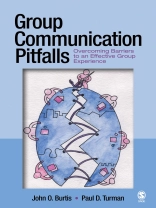‘They have done this with a rich, provocative, and creative conceptual vocabulary that will resonate for readers who practice, supervise others′ practice, teach about or do research in group life and group work.’
—Paul H. Ephross, MSW, Ph D, Professor, University of Maryland School of Social Work
Group Communication Pitfalls: Overcoming Barriers to an Effective Group Experience treats groups and the work involved in grouping as useful tools humans have developed for responding to pressures or demands faced by group members. This book assumes an orientation that expects and detects group pitfalls as they arise, providing students with the foundation for overcoming barriers to effective group experiences. By assuming this orientation, authors John O. Burtis and Paul D. Turman offer readers a map of the group pitfall terrain and demonstrate how people working well together can use the struggle against such pitfalls to improve their groups.
Key Features
- Provides students with a unifying theoretical framework and pedagogical orientation, which organizes a very broad range of research findings into tight and useful classifications
- Takes a comprehensive approach that frames current small group communication literature through a theoretical lens provided by Breakdown-Conducive Group Theory
- Reviews research findings from a variety of methodological perspectives and directly describes applications of the concepts discussed across each chapter
- Offers extensive skills enhancing material to help students apply the theoretically based concepts discussed in the book
สารบัญ
Preface
Unit I: We Co-construct Our Groups by Communicating
1. Why Study Group Communication Pitfalls?
Overview of the Book
Why Do Groups Matter Enough to Make a Study of Them?
Definitions of ‘Communication’, ‘Group’, and ‘Pitfalls’
Casting a Wide Net to Include All Pitfalls and Breakdown
Group Communication Pitfalls by Commission or by Omission
The Breakdown-Conducive Group Framework
Why Should We Focus Our Study of Groups on Group Communication Pitfalls?
2. How Grouping and Group Direction Help Create Effective Group Experiences
The Universals of Grouping Activity
The Framework for Grouping and Group Direction
Rhetorical Situation and a Purgatory Puddle
Unit II: We Struggle to Co-construct and Frame Our Circumstances and Processes
3. Pitfalls in Task and Supragroup Exigencies
Groups as Systems
Purgatory Puddle Pitfalls
Supragroup Pitfalls
Wrong Task for a Group
How to Expect, Detect, and Correct These Pitfalls
4. Personnel Pitfalls
‘Wrong Group for the Task’ Pitfalls
Traits
Orientation
Style
Circumstances
How to Expect, Detect, and Correct These Pitfalls
5. Pitfalls in Grouping Techniques, Tendencies, and Process Prizes
Grouping Techniques
Technique Pitfalls
Grouping Tendencies: Norms and Roles
Norm Pitfalls
Role Pitfalls
Process Prizes
Process Prize Pitfalls
Deliberation Outcome Pitfalls
6. Pitfalls in Confusion, Conformity, Conflict, and Group Consciousness: Grouping Concomitants
Confusion Pitfalls
Conformity Pitfalls
Conflict Pitfalls
Consciousness Pitfalls
How to Expect, Detect, and Correct These Pitfalls
7. Pitfalls in Vision and Direction Giving
Vision/Outcome Pitfalls
Savior Complex Pitfalls
Ascension Pitfalls
Transitions Pitfalls
How to Expect, Detect, and Correct These Pitfalls
Unit III: We Co-construct Our Exigencies for Grouping Into Our Group Outcomes
8. (Un)Intended Group Outcomes
Dynamics Involved in Potential Group Outcomes
A Set of Potential Group Outcomes
9. To Group or Not to Group, That Is the Question
General Exigencies Against Grouping
Distrust of Grouping
Distrust of Self as a Grouping Member
Distrust of Any Aspect of This Particular Grouping Effort
Inertia and Specific Exigencies Against Grouping
How Exigencies Against Grouping May Manifest
Expecting, Detecting, and Correcting These Pitfalls: General Orientational Advice
10. Observing Groups Well
Observing Groups
Improving Observational Focus and Quality
Observing the Purgatory Puddle
Observing The Way/Process
Observing the Vision/Outcome and the Savior Complex
เกี่ยวกับผู้แต่ง
Paul D. Turman (Ph D, University of Nebraska) is the Vice President for Research & Economic Development for the South Dakota Board of Regents. His scholarly research focuses on the role of communication in the coach-athlete and parent-child relationship within a sport context. Prior to his time with the Board of Regents, he taught courses in communication and sport at the University of Northern Iowa. His scholarly work has been published in journals such as Communication Education, the Journal of Applied Communication Research, the Journal of Family Communication, and Communication Studies.












